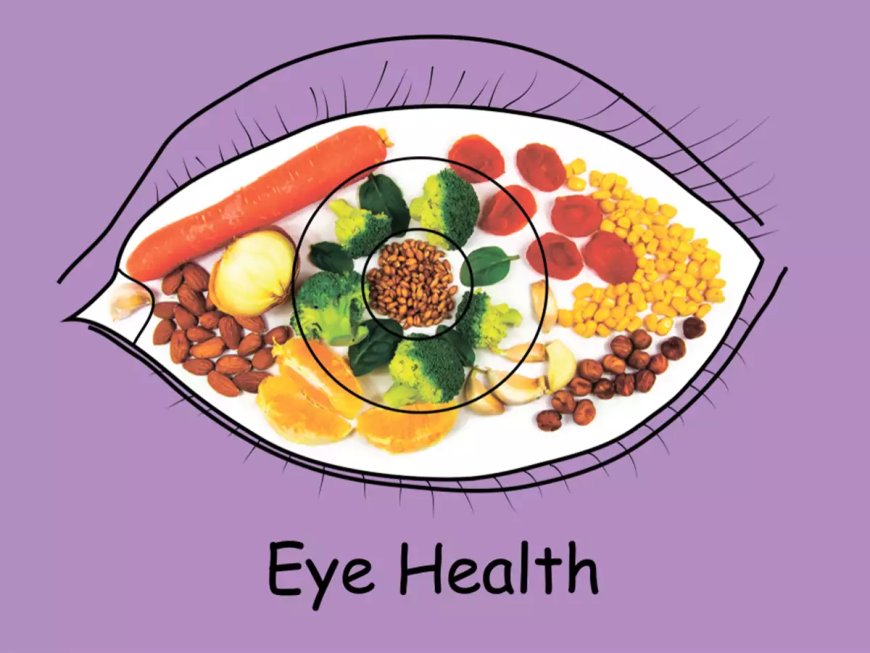Importance of nutritional diet to recover eye weakness
Weakness of the eye can deteriorate your quality life-a healthy diet rich in vitamins and minerals is all you need to encourage recovery and prevent it

As much as eye health is fundamental for overall well-being, it remains an area that many people ignore until related issues arise. Blurry vision, eye strain, and focusing issues can also result of a number of factors, including extensive screen time or simply aging happening naturally due to poor nutrition. Thankfully, eating a healthy diet full of nutrients can help support our eye health. You can get the assistance of a "registered dietitian" to develop a specialized dietary regimen for enhancing vision acuity and other factors that have an impact on eye health. In this article, we investigate the role of a good diet in overcoming eye strain and 10 food-based treatments that are best for improving your sight.
What Causes Eye Weakness?
1. What is Eye Weakness?
Also, get used to wanting a new lens for eye fatigue, poor vision that can occur in the form of sensitivity, sore eyes, and difficulty seeing. It can affect daily activities such as reading, driving and the use of digital devices. Eye weakness is the general term that includes different types of eye conditions such as refractive errors, dry eyes, and age-related macular degeneration.
2. Common Causes of Eye Weakness
Multiple hours of screen time: The overuse of electronic screens can cause digital eye strain, or computer vision syndrome. This phenomenon leads to symptoms like eye exhaustion, dryness, and discomfort, as well as an inability to focus rapidly with your vision.
Age: As we get older, the chances of getting eye diseases that result in loss of vision - including cataracts, glaucoma, and macular degeneration increase.
Lack of key nutrients: such as vitamin A, vitamins C and E with omega-3 fatty acids can damage your eyesight because the Eye needs certain compounds to function properly.
Diseases like diabetes and high blood pressure can also cause damage to the eyes resulting in diabetic retinopathy or hypertensive retinopathy.
Nutrition and Eye Health
Proper nutrition with a lot of vitamins (A, D and E) antioxidant rich foods for healthy eyes is essential to prevent vision loss. Some of the nutrients have been researched and now confirmed to aid in proper eye sight, protect from damage and help repair failing eyes.
Key Nutrients for Eye Health
Vitamin A
Reading & References Vitamin A supports retinal health and is important for the way your eye converts light into signals sent to brain. It helps protect against night blindness and dry eyes, making it one of the most vital nutrients for ocular health.
Food sources: Carrots, sweet potatoes, spinach and liver are the best food that contain Vitamin A. Include these foods in your diet to prevent any eye problems from occurring soon in the future; they may also help you for better vision too.
Vitamin C
This nutrient-rich vitamin is an effective antioxidant that prevents oxidative stress and free radical damage from affecting the eyes. It also promotes the health of blood vessels within the eyes, contributing to cataract and age-related macular degeneration prevention.
Food Sources: Vitamin C is found in abundance in citrus fruits, strawberries, bell peppers and broccoli that help strengthen the eye tissues to be kept healthy for better vision.
Vitamin E
Vitamin E, which helps protect the eyes from oxidative harm and is essential to preserve eye cells intact. It is specially useful in delaying the onset of age-associated eye diseases.
Where to get it: Nuts, seeds, and green vegetables contain a lot of vitamin E which can delay the progression of vision problems in old age.
Omega-3 Fatty Acids
Omega-3 fats, with DHA being especially crucial in optical health and an anti-inflammatory for the eyes. They are helpful in addressing conditions like dry eyes and necessary for the proper functioning of your eyes.
Good Dietary Source: Fatty fish (like salmon, mackerel and sardines) as well flaxseeds or chia seeds are top sources of omega-3s. Including these foods on your plate can boost tear production and save you from dry eye syndrome.
Lutein and Zeaxanthin
Lutein and zeaxanthin are two carotenoids that build up in the retina to prevent oxidative stress from blue light. Often called sunglass for the eyes as they protect our god's gifts of Eyes.
Diet: Lutein and zeaxanthin can be found in kale, spinach and corn; egg yolks are relatively high as well. Eating these foods regularly can block some light that harms the eye and help keep your eyes healthy.
Include eye-healthy nutrients in your diet
Dress up in Nature's Bright Colors
Different colors of fruits and vegetables contain different vitamins, minerals, and antioxidants beneficial for the eyes so its very important to eat all colorful fruits. Leafy greens (spinach, collard/turnips/mustard greens), yellow and red bell peppers and squash/pumpkin are really good for your eyes.
Practical Tips:
Mix spinach or kale with smoothie Use of lutein and zeaxanthin.
Add bell peppers and citrus fruits to the salads in order to better your intake of vitamin C,
Carrots, cucumbers and hummus for healthy eyes in snacks.
2. Eat good fats
Fats such as those in nuts, seeds and oily fish are also needed to absorb fat-soluble vitamins A and E which support our eye health.
Practical Tips:
Vitamin E and omega-3s are great for the brain so add some almonds or walnuts to your breakfast
Eat two servings of fish, such as salmon -- each week to get enough omega-3.
Cook with olive oil for healthier fats that help the body better absorb the nutrients.
3. Stay Hydrated
Dry eyes might lead to eye weakness, tears are mainly available due to proper hydration. Water — Drinking enough water keeps the eyes hydrated and helps reduce eye strain.
Practical Tips:
Consume eight or more glasses of water a day to stay well-hydrated.
Adding foods that hydrate : such as cucumber, watermelon or oranges.
Seeing a Registered Dietitian against Eyes
Theoretically, good eye health can be had through diet alone, but consult with a Registered Dietitian to ensure sufficient intake of nutrients. Your dietitian can assess your potential for any deficiency, identify foods designed to treat healthcare conditions and build a whole plan supporting your vision improvement efforts.
Advantages of Nutrition Counseling
The advantages of going for nutrition counseling by a registered dietitian are countless when it comes to maintaining optimal eyesight — personalized meal plans that tickle your taste buds, nutrient-rich recommendations according to the status of your health and there is more. So, if you search "nutritionist near me," look for a particular one who specializes in eyes and chronic diseases.
What Is Nutrition Counseling Going To Be Like?
Personalized Meal Plans: Designed to combat your unique eye health needs and dietary requests.
Nutrient Tracking: keep an eye on intake of the critical nutrients required for optimal functioning in your eyes.
Behavioral Support: Assisting with incremental changes in diet that are sustainable and support long-term eye health.
Conclusion
Weakness of the eye can deteriorate your quality life-a healthy diet rich in vitamins and minerals is all you need to encourage recovery and prevent it. You can boost your vision and prevent further decline by eating foods rich in necessary nutrients such as vitamin A, C & E, omega-3 fatty acids, and antioxidants. Speaking with a 'Registered Dietitian' or locating an excellent nutritionist near me will help you determine the ideal nutritional decisions for your individual requirements, and this could make sure that not only are you looking after those eyes of yours, they stay healthy to get so long as possible in life.
What's Your Reaction?














![Prima Ease CBD Gummies [I've Tested] TRUTH EXPOSED!](https://news.bangboxonline.com/uploads/images/202412/image_430x256_6766ac778f8ee.jpg)







